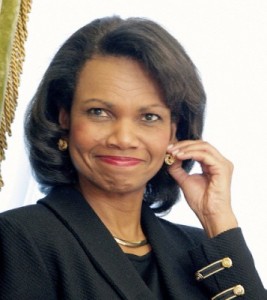I still think of myself as a reporter—my role for three decades—although as Washington bureau chief for RealClearPolitics, the bulk of my job these days is editing and managing. When I do write, much of that time is spent on a Sunday column that appears on RCP’s front page and the op-ed page of the Orange County Register.
But like a straight news reporter, or even a book author, a columnist can get all the facts right and still be wrong. That is to say that, either by omission or implication, a writer can leave the wrong impression with readers. I may have inadvertently done just that in my most recent column, which was about the ideologically driven campus goons—both professors and students—who’ve threatened disruptions at their schools’ graduations ceremonies unless administrators agreed to rescind invitations to the scheduled commencement speakers.
These tactics have worked at various colleges; my May 25 piece focused most closely on the ugly behavior at Rutgers University resulting in the cancellation of a planned address by former Secretary of State Condoleezza Rice. I mentioned in that column that an assortment of left-wingers at the University of Minnesota tried to pull a similar stunt against Rice last month over her planned talk on the occasion of the 50th anniversary of the passage of the Civil Rights Act.
In Minnesota, unlike New Jersey, students and administrators stood their ground, a point I probably should have mentioned. One Twin Cities undergrad—his name is Anders Koskinen—felt sufficiently aggrieved at my passing reference to his school (I wrote that the character assassins at Rutgers “apparently were emboldened by their brethren at the University of Minnesota”) to send me a note.
“I am currently a student at the University of Minnesota,” he wrote, “and as a student of both journalism and political science it was my privilege to see [Rice] speak as part of the Carlson Distinguished Lecture Series, and to write an article on the resulting protests for The Minnesota Republic, the conservative monthly paper on campus.”
“The University of Minnesota did not seek to stop her speaking,” Anders added. “A small contingent of staff and students, the latter of which primarily came from the student group Students for a Democratic Society, did seek to block her speaking. They, with the help of math Professor William Messing, encouraged the University Senate to ask the Humphrey school to rescind her invitation to speak, but they failed to do so.”
He went on, so let’s let young Mr. Koskinen take it from there:
“The University of Minnesota is not, as your article implies, a weak-willed institution that is all too eager to cave in to the demands of the loony left. The Minnesota Student Association (the undergraduate student government) passed a resolution asking for stern opposition to the University Senate resolution that would have attempted to block Dr. Rice from speaking.
“The University Senate defeated the resolution by a landslide vote of 122-2—even after the resolution had been toned down to ask merely for the condemnation of Rice’s speaking engagement. When the student government, University Senate, and even University President Eric Kaler weigh in in favor of free speech and maintaining Rice’s speaking engagement, it cannot be said that any group of left-wing protestors can take any heart from the result of the attempt in Minneapolis.
“I am proud to be a student of the University of Minnesota, in part precisely because it is an institution where the students, faculty, and staff for the most part recognize that free speech and academic discourse are things to be valued over the feelings of overly sensitive left-wing activists who only support free speech when it agrees with them.
“I am especially thankful to see President Eric Kaler make statements such as the one he made to the University Senate, in which he said: ‘I have opinions that sometimes differ from yours or others on our campus. That’s healthy, I invite that, and that’s the nature of civil discourse. But we can’t have true academic freedom at the University of Minnesota by denying a stage to those we disagree with or disapprove of.’”
Anders ended his note to me by saying he found it “a great privilege” to hear Condi Rice speak, and that he was honored to be attending a university that allowed him that opportunity, rather than one that would capitulate “to a small group of disproportionately loud liberals who would see her silenced.”
I would add a couple of points to this young man’s letter. First, it would be nice if the president of the United States expressed the same ardor for intellectual tolerance as the president of the University of Minnesota. Secondly, although Anders Koskinen does not explicitly reveal his college major, he hints that it might be journalism. I hope this is the field he chooses—and that he sticks with it.
. . . . . . . . . . . . . . . .
Carl M. Cannon is the Washington Bureau Chief for RealClearPolitics.

